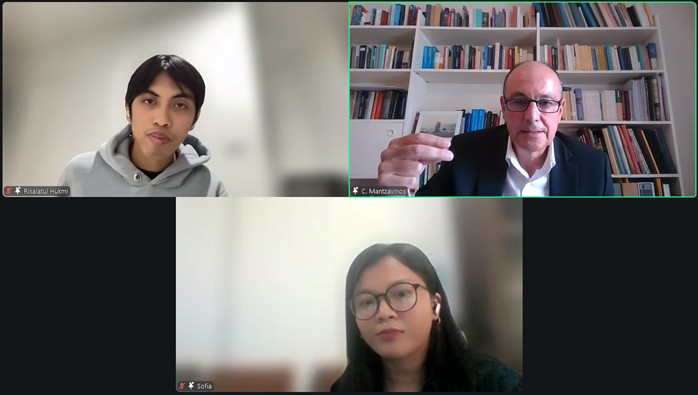
The Faculty of Philosophy at Universitas Gadjah Mada held a book discussion on The Constitution of Science by Chrysostomos Mantzavinos, professor at the University of Athens, via Zoom on September 12.
The event featured the author himself as the main speaker, with Risalatul Hukmi serving as the respondent who offered a critical review of the book, published by Cambridge University Press in late 2024.
In his presentation, Mantzavinos emphasized that science is both an extraordinary human achievement and an unfinished project. He stated:
“Science is one of the most successful human enterprises. Science needs values. Epistemic values such as truth, consistency, coherence, and so on, but also non-epistemic values such as freedom, honesty, integrity, and so on. Every attempt to justify a value falls into a logical circle, infinite regress, or dogmatic assumption. The best way to face the Münchhausen Trilemma is by adopting fallibilism, value pluralism, and the principle of critical scrutiny.”
He also highlighted the importance of understanding science within its social and institutional framework, not merely as an individual endeavor. “Institutions are the rules of the game, organizations are the players. Science is a social game in which individuals and scientific organizations pursue diverse goals. For this game to run well, we need a constitution of science that guarantees freedom of expression, rational control through critical discussion, and healthy scientific competition. Procedural principles such as open access and the synergy of formal and informal institutions are prerequisites for sustaining the autonomy of science,” he explained.
Concluding his talk, Mantzavinos underscored the necessity of internationalization as a safeguard for the autonomy of knowledge. “The most effective way to guarantee the autonomy of science is internationalization. Scientists have a homeland, but science does not. Cosmopolitanism may be impossible for citizens and scientists alike, but science can remain cosmopolitan as long as its ethos and methodology are upheld by the scientific community. Only in this way can science endure as a universal human project, free from narrow political and economic domination,” he affirmed.
